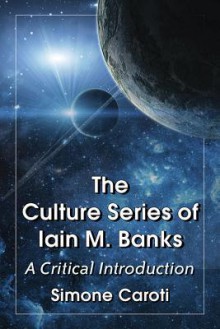

Cat Ellington's new book, Reviews by Cat Ellington: The Complete Anthology, Vol. 1, is a funny and entertaining read! Haha!!!!! I thoroughly enjoyed her insightful and sage reviews of a bunch of crazy characters who oftentimes find themselves in dangerous situations, sometimes by their own making.
And speaking of the unforgettable people depicted in many of the top rated books reviewed in her first volume, Cat Ellington's sharp humor also reveals itself as she nudges her reader towards the plot in which the characters are chasing after desires that prove to be elusive, if not worthless. Excellent read! So sit back and enjoy the ride with the one and only Cat Ellington.

"Banks loved metafictional negotiations, complex plots, and deconstructionist approaches, but he also loved story; he tied every subplot, told the tale of every character, and made sure to repay out good faith in him in kind.”
In “The Culture Series of Iain M. Banks - A Critical Introduction” by Simone Caroti

‘In Blade Runner, also, it is an authentic relationship to Being that is taken to be what essentially ensouls both humans and replicants. Such is the import of Roy Batty’s famous final soliloquy:
“I’ve seen things you people wouldn’t believe. Attack ships on fire off the shoulder of Orion. I watched C-Beams glitter in the darkness at Tannhäuser Gate. All those moments will be lost in time like tears in rain. Time to die.”’
In “Philip K. Dick and Philosophy - Do Androids Have Kindred Spirits” by Dylan E. Wittkower
I just wanted to say that in my opinion any attempt to construct a coherent interpretation pf Phil Dick’s universe is missing the point. To be able to to construct a Weltanschauung of Dick’s writing we should focus only on philosophy. In all of Dick’s fiction time and causality are of the essence. The point is that, once time and causality become malleable, there is no hope of forming a solid, consistent interpretation of events in Dick’s fiction. That leads to our questioning the Nature of Reality. The focus shifts from epistemology - the problem of knowledge - to ontology - the way different realities are produced. This shift, according to Brian McHale, is precisely what defines the transition from modernism to postmodernism. In its resistance to coherent interpretation, "Ubik" is similar to certain more "literary" works of the 60s, for example the “nouveau romans” of Robbe-Grillet, or Richard Brautigan's "In Watermelon Sugar". (Granted these are very different stylistically). Is it because Dick is writing SF that so many assume the incoherence is sloppiness rather than a deliberate rhetorical strategy?
I think Robbe-Grillet was perhaps deliberately, not just stylistically, trying to put thinking and theorizing about the art of writing into the structure of his novels to create novelty, as writing, which he called “Noveau Roman”. I don't know what Brautigan was trying to do, but Phil Dick's subjects and concerns about reality weren't about writing per se, but about living. I don't think he was trying to deliberately create a new kind of writing or novel. That doesn't mean his works are narrowly interpretable, but many, many SF novels have time travel, space/time warps, and so on, but are interpretable. Interpretations or readings are just perspectives which aren't meant to be the truth, the whole truth and nothing but the truth. Reasonably consistent interpretations are possible, such a everything-is-perfect's Jungian analysis. Works like Phil Dick's makes people want to interpret them and present many overlapping and partial possibilities of interpretation and perhaps ultimate impenetrability.
If you're into Literary Criticism on Phil Dick, read on.